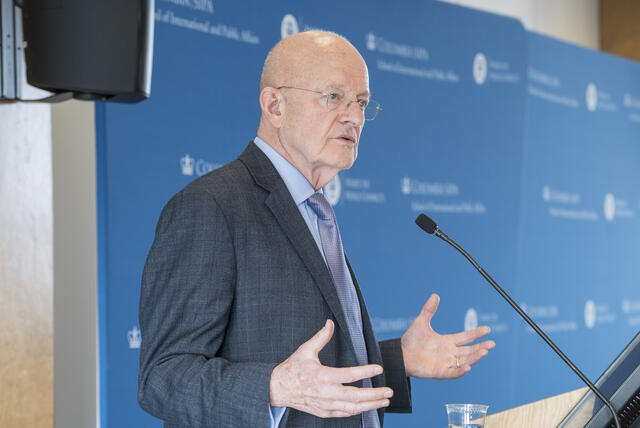
James Clapper Reflects on Storied Career in Intelligence

“My God, I raised my own replacement.”
This was the reaction of the U.S. Army signals intelligence officer James Robert Clapper once he found out what his eleven-year-old son, also named James, was secretly working on at his grandparents’ house in Philadelphia in 1953.
The Clappers had dropped off their children while looking for new housing in the States after an assignment in Japan; that is also when the younger James came across the television for the first time. He turned on the television late one night because of his jetlag, and stumbled upon the Philadelphia police dispatcher. He followed the calls, addresses, and brevity codes every night and plotted the moves on a map of the city, which he then presented to his family when his parents came to pick up his sister and him. The rest is history.
Fast forward to year 2019 — James Robert Clapper, Jr. spoke to full house at SIPA as the longest-serving Director of National Intelligence (DNI). The event was moderated by Peter Clement, senior research scholar at SIPA and former Deputy Director for Intelligence for Analytic Programs at the Central Intelligence Agency (CIA), and sponsored by SIPA’s Saltzman Institute of War and Peace Studies.
Clapper shared highlights from his memoir, Facts and Fears: Hard Truths from a Life in Intelligence, but devoted the bulk of his time to answering questions from the audience. He pointed to the takedown of Osama bin Laden on May 2, 2011 as the high-point of his 56-year career in intelligence.
“We have been closeted in the White House Situation Room for 13 hours, and when were 99 percent sure that we had [bin Laden], it was time for President [Obama] to make an announcement to the nation. A few of us left the West Wing to go the East Room. And I’ll never forget walking out the door, the word had gotten out, and there was a huge crowd across from the Rose Garden chanting, ‘USA!’, ‘USA!’, ‘USA!’ Boy, it really hit me...It was a closure for the country, the intelligence community, and many others.”
Clapper singled out the leaks of classified documents by Edward Snowden as the low point of his career. He disputed the notion that Snowden was a hero and elaborated on the damage the revelations have inflicted on the capability to protect American lives as well as incalculable loss of taxpayer dollars.
“The problem is that [Snowden] exposed so much else that had absolutely nothing to do with the so-called domestic surveillance,” Clapper said. “For an example, we had a program with the Afghan government called ‘Lawful Intercept’ where the Afghanistan Ministry of Interior was collecting cell-phone calls from their own citizens and we had a cooperative arrangement to share the map, and that was the single most important source of warning for IED attacks against our soldiers. President Karzai [of Afghanistan] shut it down and thus depriving us of the single most important source of warning.”
Clapper visited North Korea in November 2014 to retrieve two Americans who were being held and sentenced to labor camps. He has been closely following the Korean peninsula throughout his career and called for a “rethinking” of America’s approach to North Korea. Clapper supported opening a U.S. diplomatic office in North Korea both as a means to collect information on the ground and a conduit for flowing information into the country.
“The most disturbing thing not only in my time as DNI but in intelligence was the Russian interference in our election in 2016,” Clapper said. “That was, in fact, the major motivation in my decision to write the book. I’ve seen many bad things during my time in intelligence, but nothing as disturbing viscerally as that.”
Clapper said he “lost patience with Congress” when he could not get support from Republican leaders to act against the Russian interference in the 2016 U.S. Presidential election. When he had decided to make a rare public warning as DNI, it was overshadowed by Donald Trump’s lewd comments during Access Hollywood taping the following day.
“I think [the Russians] are every bit as aggressive as they were in [the Cold War],” Clapper said. “What is different is not so much their attitude as much as their capabilities that the Internet and cyber provides because it is so pervasive. That to me is the big difference.”
The greatest long-term threat to the U.S., Clapper said, will be China. He cited China’s economic size, science and technological prowess, and military modernization as the factors. He mulled over the tremendous benefits of U.S.-China cooperation but the latter was “clearly a competitor.”
Clapper shared his thoughts on the state of the union as well, expressing strong support for his successor Dan Coates as “an honorable man” and assured that a majority of the intelligence community is unaffected by political turmoil because of the technical nature of the duties. He encouraged those who wanted to join the intelligence services to sharpen their regional expertise and language skills.
He is concerned, he said, about the growing consumption of misinformation, which erodes the institutions relying on truth to uphold American society. He cautioned the public to “not believe everything you see, read, or hear on the internet”, but reaffirmed his faith in his country’s future.
“We will continue speaking truth to power whether power listens or not.”
— Jeenho Hahm, MPA ’19